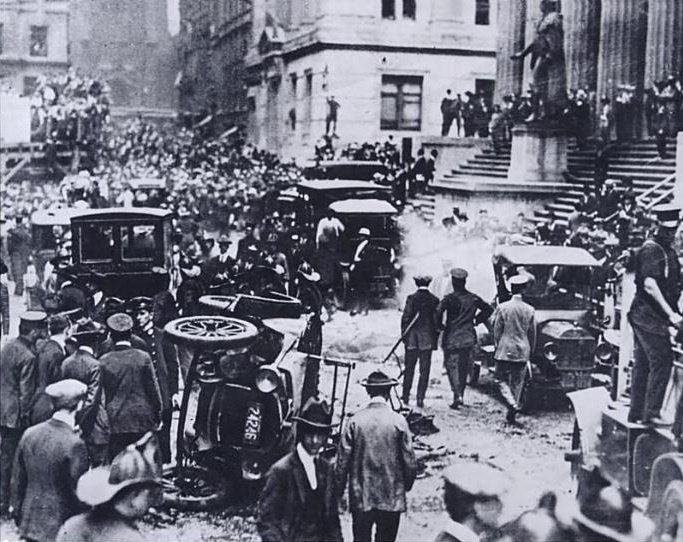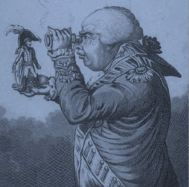 At just after midday on 16th September 1920, on the busy corner of Wall Street and Broad Street, a bomb left in horse drawn cart exploded firing around five-hundred pounds of cast-iron slugs into the lunchtime crowd. A timer triggered the detonation of about one-hundred pounds of dynamite, which vaporised the horse and wagon, killed thirty-eight people and injured four-hundred more. The explosion also caused more than two-million dollars worth of damage to the surrounding buildings, including the J. P. Morgan Inc. bank on the opposite side of the street.
At just after midday on 16th September 1920, on the busy corner of Wall Street and Broad Street, a bomb left in horse drawn cart exploded firing around five-hundred pounds of cast-iron slugs into the lunchtime crowd. A timer triggered the detonation of about one-hundred pounds of dynamite, which vaporised the horse and wagon, killed thirty-eight people and injured four-hundred more. The explosion also caused more than two-million dollars worth of damage to the surrounding buildings, including the J. P. Morgan Inc. bank on the opposite side of the street.
Nobody claimed responsibility for the attack, which is seen by many as the first car-bombing, but a note was found in a mailbox on the corner of Cedar Street and Broadway that read "Remember we will not tolerate any longer. Free the political prisoners or it will be sure death for all of you. American Anarchist Fighters." This note and the choice of target in the centre of American capitalism suggest that the attack was part of the anarchist 'propaganda of the deed' campaign that started in the late nineteenth-century, leading some historians to point the finger at Galleanists, supporters of Italian anarchist Luigi Galleani - two of whom, Sacco and Vanzetti, had been arrested in Massachusetts earlier that year.
Related posts
Haymarket Affair: 4th May 1886
Italian King assassinated: 29th July 1900
U.S. consulate in Quebec City bombed: 24th May 1968
West German embassy siege in Stockholm: 24th April 1975
Customised search for historical information
16 September 2009
On this day in history: Wall Street Bombing, 1920
Labels:
C20th,
North America,
Politics
Subscribe to:
Post Comments (Atom)















3 comments:
Wow, I would have never guessed that this kind of thing would have happened in the US in 1920.
What an ugly precursor to what happened later last century and this one!
I'd never heard of this.
Thanks to you both for the comments.
Terrorism is nothing new, although, one might think otherwise judging by the recent media frenzy. There were many more terrorist attacks in the US in the early 70s than there are today, mainly due to groups like the Weather Underground (aka the Weathermen).
Post a Comment